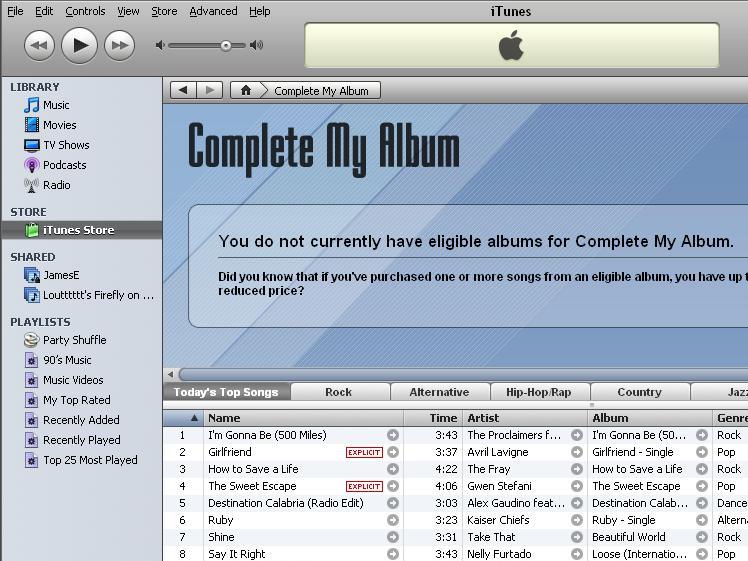Opinion: forget the stick BPI, give us more carrot!
Why the music industry's latest attack on file sharers doesn't address the real issues

As we reported last week, a big crackdown has begun on Internet music pirates in the UK. The British Phonographic Industry (BPI) has enlisted six of the biggest Internet service providers (ISPs) to its three-tiered attack on song sharers. The first step will be thousands of warning letters, with ISP disconnection the final third threat.
But how effective will such a stick-based approach really be, and does it actually address the underlying issues of the emerging Internet culture? After all, the criminalisation of drugs hasn't exactly eradicated their use. It stopped people smoking pot in public, but has otherwise pushed hardcore drug culture underground, and dealers have increased their weapon arsenals to defend themselves from the police.
Similarly, hardcore P2P users are switching to 'safepeer' systems, which block the IP addresses of known surveillance organisations. They are increasingly using encryption as well. So the BPI's strategy may scare off occasional sharers, but it's likely to increase encrypted traffic, which even MI6 will have trouble cracking into- and it will legally require 'just cause' to do so anyway.
Essentially, you could be sharing the latest from Girls Aloud, or you could be sharing plans for a dirty bomb. You might even be sharing family photos. There will be no way of telling from your Internet traffic, and no legal reason to find out unless you're a suspected terrorist.
The return of read-write culture
However, there are deeper issues at stake here. File sharing is merely a symptom of a huge shift in how we consume media content in the Internet age. Stanford law professor Lawrence Lessig has summed up the brave new world as a return of 'read-write' culture, in contrast to the 20th Century era of mechanical recordings where most of us were 'reading'- in other words, passively consuming mass-produced content.
The Internet has allowed consumers to take a much more active role in their media consumption. At the most write-oriented end of the spectrum, everyone can post amateur music tracks on Myspace and cameraphone movies on YouTube. But it also means we expect the content we want, when we want, where we want, and on the device we want.
Sign up for breaking news, reviews, opinion, top tech deals, and more.
Ownership means something rather different in the Internet age, too. Clearly, things of value do need some form of protection. You wouldn't expect people to leave their car or house unlocked- so why should you leave music and movies so easily pilfered?
But the digital revolution contrasts radically with when value was directly connected to a physical thing. When you steal the contents of my house, or my car, I no longer have those things. Steal a digital copy of my music, however, and I've still got it. This is why most people don't see file sharing as theft. It doesn't feel like depriving anyone of anything. The loss of income usually cited by the music, film and TV industries is merely a wild estimate, as there is no clear evidence that people would exhibit the same consumption habits if the content wasn't free.
Seen in this context, the BPI's actions are still the flailing of a media industry which doesn't understand the shift in culture, and wants to return content back to being a thing. This is because the recording industry is founded on making you pay for a copy by making you pay for the thing onto which it is copied – the LP record, CD or DVD. The Internet is by its very nature the opposite of this, and the recording industry should really be focusing attention on products which capitalise on these new capabilities rather than suppressing them.
Sharing IS the Internet
NME's news editor Paul Stokes also told us on Friday that we now have "a generation who won't buy music without hearing it first." But which generation ever did this anyway? First there was music radio, and now we have Internet radio and novel systems like Last.fm, which provide music playlists based on similar taste.
This isn't that different from the days of cassette tapes, where teenagers shared music compilations between friends. Even back then, it was already illegal. Without these bedroom tape compilations, though, no new music would have been purchased at all, because nobody would have heard it in the first place if it wasn't being played on the radio. The Internet was designed precisely to amplify this kind of sharing of ideas.
The true originality of the Internet is how it allows us to collaborate with people of similar interests – rather than being forced to make do with the people we find in the same physical location. Thanks to the net, we can find more things we actually like, rather than being stuck with what big media organisations want us to pay for. That is the baby which really must not be thrown out with the file sharing bathwater by the likes of the BPI.
Dr James Morris has worked as a technology journalist for over 25 years, including spending nine years on the staff of market-leading computer magazine PC Pro, the last five of which were as the publication’s editor. He specializes in enterprise-grade software and hardware, with a particular focus on content creation.
